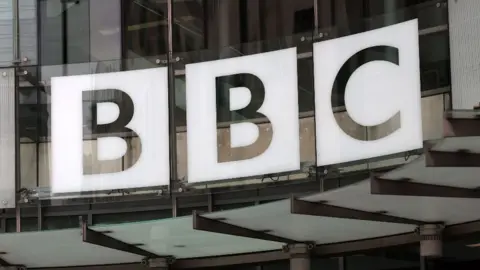BBC pulls the documentary in Gaza by doctors due to the fears related to neutrality
 EPA
EPABBC says she decided not to broadcast a documentary on doctors working in Gaza, due to the fears related to the impartiality surrounding production.
Gaza: Doctors who are attacked by the BBC, but it was produced by an independent production company. It was originally to broadcast in February, but it was not yet broadcast on any port of the British Broadcasting Authority.
In a statement, the British Broadcasting Corporation said it was “determined to report all aspects of the conflict in the Middle East in an ocean in a way that.”
“The BBC will finally allow the release of this movie.” The British Broadcasting Corporation confirmed that it was “transferring the ownership of the film’s materials to the films of the lower floor.”
The founder of the production company, Ben de Bir, said earlier this week that the BBC had “failed completely” and that journalists “were injured and silent.”
BBC News understands the decision to attach the documentary on Thursday, after public comments by De Bear at the Sheffield Documentary Festival, and another of the film’s managers, journalist Ramita Navi, who It appeared on Radio 4 today Discussing the war in Gaza.
Navi told the program that Israel “has become a rogue state committing war crimes, ethnic cleansing and Palestinian mass killing.” Israel denied the accusations of war crimes and genocide in Gaza.
It was a different documentary film, Gaza: How to survive the Waddard area, It was withdrawn from iPlayer earlier this year After the appearance of her 13 -year -old narrator, he was the son of Hamas official.
Gaza: The doctors who are attacked – also known as Gaza: the paramedics under the fire – are studying the experiences of the Palestinian paramedics who work during the war in Gaza.
The film was directed by Karim Shah, Navi and De Bear, former editor of 4 News.
In a statement on Friday, the BBC said that it cost the documentary more than a year ago, but it stopped the film in April, “after making a decision that we were unable to broadcast the film while reviewing a separate documentary in Gaza.”
“With both films from independent production companies, both of them around Gaza, it was right to wait for any relevant results – and put them into practice – before broadcasting the film.
“However, we wanted to hear the voices of doctors. Our goal was to find a way to broadcast some materials in our news programs, in line with our neutral criteria, before publishing the review.
“For several weeks, the BBC is working with the lower floor movies to find a way to tell the stories of these doctors on our platforms.
“yesterday [Thursday]It became clear that we have reached the end of the road with these discussions. We have reached the conclusion that broadcasting this article risks a sister -in -law that does not meet the high standards that the public expects the BBC. “
The company added that contrary to some reports, the documentary “was not subject to the final login before broadcasting in the BBC,” adding: “Any movie broadcast will not be a BBC movie.”
He continued: “We want to thank the doctors and shareholders and regret that we were not able to tell their stories. BBC will continue to cover the events in Gaza with integrity.”
In its own statement, The lower floor films claimed that she had been granted “at least six dates for a different release” and the film passed through “the long and repeated compliance process as well as verifying accurate facts.”
He continued: “Our argument all the time was to tell the story of doctors and the doctor as quickly as possible, and the people who convinced us to speak to us despite their own reservations that the BBC will tell their stories.”
“Although the BBC is now coming out of their names from this movie, it will remain for them, and we hope that it will succeed in opening the discussion on how the broadcaster in the country covers what is happening in Gaza, and that people feel free to speak and speak publicly, instead of staying silent or leave, and at some point they get the press leadership they deserve.”
Speaking at the Sheffield Documentary Festival on Thursday, before announcing the decision, De Bear specifically blamed the director Tim Davi for refusing to broadcast the movie.
He added: “The primary purpose of the BBC is television news and ongoing affairs, and if he fails to do so, it does not matter what the drama you make or cover.” As I mentioned. “It fails as an institution. If it fails, it needs a new management.
Regarding the war, Di BBC calls for “they are forced to use a language they do not know, they do not describe anything as it is clearly [for fear of impartiality] It is tragic. “
In response to DC’s comments, a BBC spokesman said, “It refuses completely[s] This description of our coverage. “
“The BBC has consistently produced a strong press about this conflict. Besides urgent news and continuous analysis, we have produced original investigations such as those in allegations of abuse of Palestinian prisoners and the use of Israel for Buster Buster and in -depth documentary films including superior life and death in Gaza, and Gaza 101.”
High -level characters such as actress Susan Sarandon and the introduction Gary Linker The company previously accused From monitoring of delay.
“This is not an editorial warning. It is a political repression,” said an open message, which was also signed by cultural figures such as Mrs. Harriet Walter, Miriam Margoulis, Mexin Beck, Juliet Stevenson and Mike Lee.
“No news organization should be quietly behind the closed doors that deserve its stories.”
“The audience should look at this important movie, and honor the bravery of the shareholders.”




